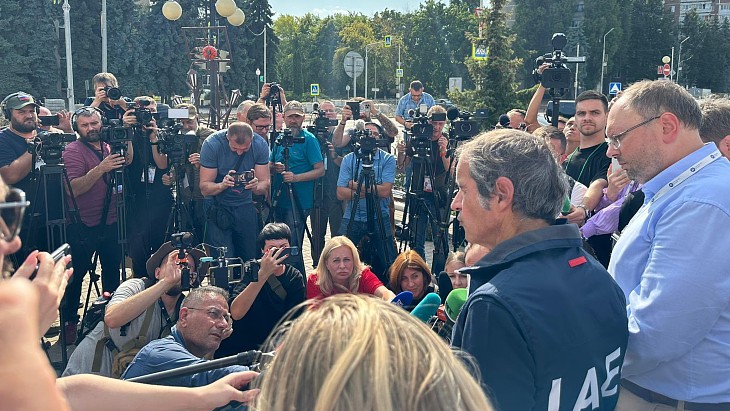According to Reuters, he told a news conference "the danger or possibility of a nuclear accident has emerged near here", adding that one of the factors increasing the risk of a "nuclear incident" was that the four RBMK-1000 reactors (two are permanently shut and one is currently in a regular scheduled shutdown) do not have an extra protective shell.
According to Russia's Tass news agency, Grossi also said: "I’ve had a possibility to visit it, to look at all the most important parts of the nuclear power plant: the reactor hall, the turbine hall, the control room, and every other essential part of the station, and the storage of the spent fuel as well." It added that he had said that it was operating "very close to normal conditions".
Russia's Rosatom said that during the visit the IAEA delegation visited both the Kursk nuclear power plant (KNPP) and the Kursk II NPP, which is under construction. It said Grossi saw KNPP unit 3 continues to operate at its installed capacity, and the design features of RBMK reactors were demonstrated. They said the results of the visit will be discussed by Grossi and Rosatom Director General Alexei Likhachev "in the established interdepartmental format in Kaliningrad in the near future".
Ahead of travelling Grossi said that he had been following the situation in the region closely in the light of "increased levels of military activity in the vicinity" and "when the Agency is called upon to fulfil its mandate to ensure that nuclear is used in a peaceful manner, we are present".
In that statement, issued on Monday, he added: "I reiterate that the safety and security of nuclear facilities must, under no circumstances, be endangered." One of the issues discussed during his visit was what measures can be taken to help in terms of boosting nuclear safety and security.
Grossi has visited the Zaporizhzhia nuclear power plant - the Ukrainian nuclear power plant which has been under Russian military control since early March 2022 - a number of times during the on-going conflict. The Kursk nuclear power plant, and the Kursk II plant under construction, are situated in Russia about 60 kilometres from the border. On 9 August, the IAEA said it was monitoring the situation after Ukrainian forces advanced 30 kilometres into Russia's Kursk region, bordering Ukraine. They had reportedly advanced within 50 kilometres of the Kursk nuclear power plant.
Grossi and the IAEA - and the United Nations Security Council - have set out the seven indispensable pillars of nuclear safety during an armed conflict and the five concrete principles established to protect Zaporizhzhia nuclear power plant - such as not firing from, or at, a nuclear power plant or using a nuclear power plant as a military base. Grossi said ahead of his visit to Kursk that the principles were applicable to any nuclear power plant.
All four units at the existing Kursk nuclear power plant are scheduled to shut by 2031. The first unit was shut down after 45 years of operation in December 2021. The original design life for the four RBMK-1000 reactors at the plant was for 30 years but had been extended by 15 years following life extension programmes. Kursk II is a new nuclear power plant nearby that will feature two VVER-TOI reactors.
According to Reuters, Grossi also told the news conference after the visit to KNPP: "I was informed about the impact of drones. I was shown some of the remnants of those and signs of the impact they had," without saying who was responsible.
Ukraine and Russia each accuse the other side of putting nuclear safety at risk and breaching the IAEA's central safety principles for nuclear facilities. Grossi explained at the United Nations in April that the IAEA would not attribute blame without "indisputable proof" and said the agency aims to "keep the information as accurate as we can and we do not trade into speculating".





_53504.jpg)

_13505.jpg)
_87975.jpg)






